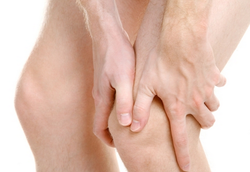
Interestingly, the knee joint happens to be the largest and the most complex joint in the human body. Although a temporary pain in the knees may be associated with some sort of recent injury or accident, yet if you experience prolonged soreness, swelling or sensitivity in the knee joints, then you need to be cautious as this may lead to onset of chronic knee pain.
Causes Of Knee Pain
There could be various causes contributing to the growth and spread of pain in the knee joint, and some of these include: improper posture or stretching while engaging in physical activities, insufficient warming up or cooling down before and after such activities, inadequate treatment of some previous injury, strains or sprains, etc. An advancing arthritis may be another reason behind the incessant pain in the knees, whereas age may also play a significant role in the surfacing of knee pains, owing to gradual wear and tear over a period of time, especially among people who have been engaged in an unhealthy diet and a rather sedentary lifestyle.
What Exactly Is Knee Pain?
The symptoms of knee pain include a sharp and shooting pain and throbbing in the knee area, along with a perpetual swelling, stiffness or discomfort in the joint. You may also experience difficulty in walking or moving about your knees and carrying out various everyday chores.
Do medicines help?
There are various medications in the form of NSAIDs and topical ointments available in the market which might provide instant relief from the pain, depending upon the type and severity of the pain. However, their regular usage may eventually make the individual resistant to their effect, and instead expose us to side effects of various kinds.
Try Out Some Natural Remedies For Knee Pain
Owing to the side-effects and after-effects that might result from regular use of NSAIDS and instant pain killers, it is significant to find out some safe and natural alternatives to curing the knee pain instead of relying wholly and solely on medication.
Haldi / Haridra / Turmeric
Turmeric is an age-old herb which is known to provide effective, long-term treatment from knee pain. Curcumin, one of its active compounds, is what lends turmeric some incredible anti-inflammatory and analgesic properties, and provides relief right down to the micro level. It has the ability to block cytokines and enzymes in our body, which are infamous for causing inflammation. It has long been used in the Ayurveda as well as traditional Chinese system of medication, and even a variety of modern day NSAIDs and topical ointments contain turmeric as an important part of the ingredients.
How To Use?
There are various ways by which we can avail the benefits, such as:
- Consuming a warm glass of turmeric milk
- Making a nice, warm cup of herbal tea by adding ginger, honey and a pinch of turmeric
- Topical application of some turmeric and warmed coconut oil on the affected area followed by a gentle massage.
The extract obtained from this ancient spice is something which herbal therapies especially Ayurveda absolutely swears by, in terms of the potent anti-inflammatory properties it possesses. An active compound called Eugenol is what makes the clove extract, also known as Lavang Tailam, so effective at curing pain associated with the knees. It has this special ability to not only counter the existing inflammation, but also prevent any new inflammatory cytokines from forming and spreading in our joints.
How To Use?
Simply mix it with some coconut oil and gently massage it on the affected area. This, moreover ridding our joints of the pain, also provides a nice, warming sensation to the affected area.
Salaki / Boswellia serrata
Also known as Sallai Guggul or the good-old Indian Frankincense, the extract of the boswellia plant has long been associated with providing anti-inflammatory benefits. This especially holds true in case of knee pains. Not only this, Boswellia is essentially anti-atherosclerotic, anti- arthritic, analgesic and anti-hyperlipidaemic in nature, and therefore the herb extract would prove all the more favourable to be used for pain and swelling associated with joints.
How To Use?
Boswellia serrata extract can be taken orally and can also be applied topically onto the affected area.
Therefore, in case you happen to be suffering from painful knees, the mentioned herbs promise an effective, long-term cure. They are by and large safe for regular use, and do not obstruct in the functioning of other pharmaceutical drugs that you may be consuming.
Watch Video: Ayurvedic Wonders Of Ghee (Clarified Butter)
About the Author:
Dr Sonica Krishan is Author and Speaker in the areas of Healthy and Joyous Living through Ayurveda, Meditation, Yoga and other Contemplative practices. She is a leading Ayurveda Professional in India. She is also Health Writer, Columnist, Editor, Ayurveda Consultant and Holistic Healing Coach. Dr Sonica is open for National as well as International Collaborations with interested people / institutions in fields of Ayurveda, Meditation and Yoga.
Dr Sonica Krishan’s Books are available at Amazon
Related Blogs:
Effective Healthcare Benefits of Sonth (Dried Ginger) for Joint Pains
Vitamin D – Essential For Calcium Management?
